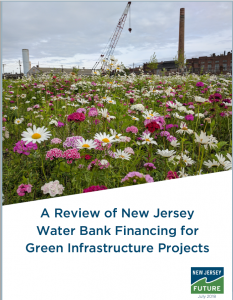Unlocking Green Infrastructure Financing Opportunities
The New Jersey Water Bank provides very favorable financing for for green infrastructure related to CSO abatement projects. So why is gaining access to this financing sometimes a challenge?
 New Jersey Future’s new analysis, A Review of New Jersey Water Bank Financing for Green Infrastructure Projects, addresses this question. The report emphasizes the importance of the state’s green infrastructure financing program, particularly for communities with combined sewer systems; describes program accomplishments including green infrastructure projects that took advantage of the Water Bank’s favorable financing and terms; reviews best practices for potential applicants to access financing more successfully; and looks at what the Water Bank is planning to do going forward to make applying for green infrastructure financing even easier.
New Jersey Future’s new analysis, A Review of New Jersey Water Bank Financing for Green Infrastructure Projects, addresses this question. The report emphasizes the importance of the state’s green infrastructure financing program, particularly for communities with combined sewer systems; describes program accomplishments including green infrastructure projects that took advantage of the Water Bank’s favorable financing and terms; reviews best practices for potential applicants to access financing more successfully; and looks at what the Water Bank is planning to do going forward to make applying for green infrastructure financing even easier.
New Jersey municipalities face a stormwater crisis – aging, inadequate infrastructure, more frequent flooding and escalating regulatory demands. Many leading communities are turning to green stormwater infrastructure as a means of leveraging stormwater investments to improve quality of life, health outcomes and economic opportunities. Experience nationwide has shown that comprehensive stormwater programs that balance green and gray infrastructure cost less, provide more versatile and effective flood mitigation, and deliver ancillary benefits to their host communities.
The 21 New Jersey cities with combined sewer systems are especially motivated to pursue green infrastructure (GI) projects, both to address state permit requirements and to reduce sewage overflows and backups into waterways, homes, streets and parks. Unfortunately, many cities and utilities with CSOs can find it challenging to put together the funding and expertise needed to realize green infrastructure projects, even for small demonstration sites. This funding gap must be solved if they are to build green infrastructure projects at the scale needed to contribute meaningfully to CSO mitigation.
The Water Bank (formerly the New Jersey Environmental Infrastructure Funding Program, or NJEIFP) has prioritized financing for green infrastructure related to CSO abatement projects, including offering special incentives such as principal forgiveness, and has awarded more than $10 million for green infrastructure projects throughout the state in the past two years alone. But more can be done to make sure potential applicants are able to take full advantage of this.
New Jersey Future has been working closely over the past year with Water Bank staff at the I-Bank and the New Jersey Department of Environmental Protection to address the challenges associated with applying for the program’s low-cost green infrastructure financing, and to identify ways to ensure CSO applicants have greater success at accessing it. Through interviews, meetings and informal conversations with Water Bank staff and applicant staff and consultants, as well as a review of lessons from the recent Build It Green initiative, the organization’s researchers were able to learn what works best about the application process and where there may be opportunities for new approaches.
The white paper lists six recently completed green infrastructure projects that took advantage of Water Bank financing, as well as applications for 13 additional projects; underscores important Water Bank policies that encourage inclusion of green infrastructure in a financed project; offers suggestions for ways potential applicants to the Water Bank GI financing program can navigate the application process more effectively; and notes a few of the additional improvements that Water Bank borrowers can expect that will make the borrowing process easier and more rewarding, such as more detailed communications and a broader array of technical assistance, guidance and support to applicants.
In fall 2018, the Water Bank, with support from New Jersey Future and its consultant BRS, Inc., will release an Applicants’ Guide for Water Bank GI Financing, which will detail for potential applicants the steps and documentation that make up a successful application. The Water Bank will also offer a workshop for potential applicants that features the Applicant’s Guide, to help clarify the application process and answer any questions about requirements.











